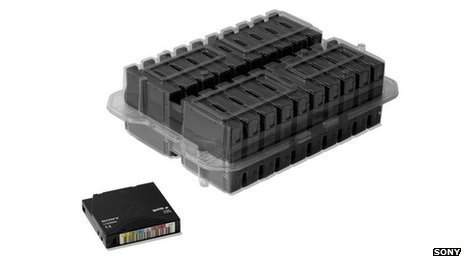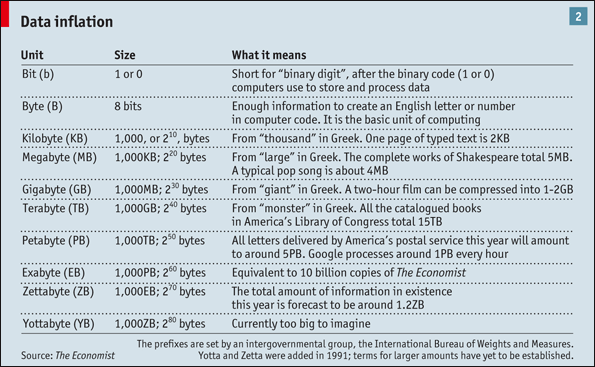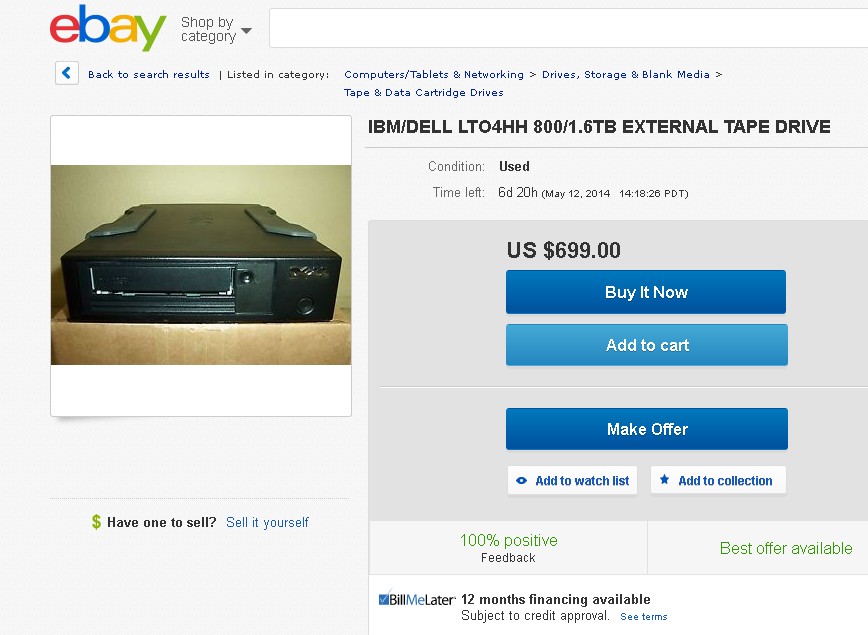It looks like you're using an Ad Blocker.
Please white-list or disable AboveTopSecret.com in your ad-blocking tool.
Thank you.
Some features of ATS will be disabled while you continue to use an ad-blocker.
share:
I have to admit that storage media is a bit of a mystery to me , I understand the theory but in practice it's some form of witchcraft, how they fit
4.7 Gig worth of data on a little shiny disk or 1 TB on a hard drive platter is beyond me .
Well Sony have just announced a new storage tape that can hold 185 terabytes of data for long term stoarge , they say the tape holds 148 gigabits (Gb) per square inch which to my tiny brain is witchcraft.

They also announced they're working on a new disk for the public which will hold 1TB of data ....about time too
Well Sony have just announced a new storage tape that can hold 185 terabytes of data for long term stoarge , they say the tape holds 148 gigabits (Gb) per square inch which to my tiny brain is witchcraft.
Created with the help of IBM, Sony's technology allows for tapes that can store the equivalent of 3,700 Blu-ray discs.
The tape hold 148 gigabits (Gb) per square inch - beating a record set in 2010 more than five times over.
Storage tapes are typically used by businesses to hold huge amounts of data for a long time.
Analysts IDC predict that by 2020, global data storage will amount to 40 trillion gigabytes - around 5,200 gigabytes per person.
Using tape is a cheaper and more energy efficient method of storing data when compared to power-hungry large data centres full of hard drives.
www.bbc.co.uk...

They also announced they're working on a new disk for the public which will hold 1TB of data ....about time too
Here's some interesting facts to show what 185 Terabytes can hold...
-- It’s three Blu-rays’ worth of data per square inch. Or, a total of 3,700 Blu-rays on a single tape. That’s a stack of boxes that would be nearly 15 feet high.
-- A single tape holds five more TB than this hard drive storage array (below), which has to be custom-made and runs for $9,305.

-- A total of 64,750,000 songs. If the average song is, say, three minutes, that’s enough music to last you 134,896 days.
-- The entirety of the Library of Congress represents about 10 total TB. One tape can hold 18.5 versions of the Library of Congress.
Source
-- It’s three Blu-rays’ worth of data per square inch. Or, a total of 3,700 Blu-rays on a single tape. That’s a stack of boxes that would be nearly 15 feet high.
-- A single tape holds five more TB than this hard drive storage array (below), which has to be custom-made and runs for $9,305.

-- A total of 64,750,000 songs. If the average song is, say, three minutes, that’s enough music to last you 134,896 days.
-- The entirety of the Library of Congress represents about 10 total TB. One tape can hold 18.5 versions of the Library of Congress.
Source
a reply to: gortex
Tape lingers around basically because it's still the best way of getting that much surface area into such a small form factor. Unfortunately, in my own experience getting things off tape after any appreciable amount of time is a super iffy proposition.
Tape lingers around basically because it's still the best way of getting that much surface area into such a small form factor. Unfortunately, in my own experience getting things off tape after any appreciable amount of time is a super iffy proposition.
Well...we are talking about tape drives here, and that is typically used solely for data storage and typically taken offsite after backups happen.
As far as HDD's go, I work in the broker market for large data-center dispositions and we regularly see 4TB drives coming in to our warehouses.
Even microSD cards are up to 128GB or more and they are smaller than the last digit of your pinky finger.
As far as HDD's go, I work in the broker market for large data-center dispositions and we regularly see 4TB drives coming in to our warehouses.
Even microSD cards are up to 128GB or more and they are smaller than the last digit of your pinky finger.
The normal casino has over 4000 cameras and they record everything.
185 Terabytes might record one days operations.
Think of the terabytes that the NSA uses
185 Terabytes might record one days operations.
Think of the terabytes that the NSA uses
I wonder what would happen to a tape if it passed throught the scanners used in airports?
In the past tape has always been unreliable. Anyone remember the - 'Verify - commands? Verified today, but useless tomorrow!!!
Does this mean we have to go back to head cleaning?
I'd rather have the smaller but more reliable micro sd cards.
In the past tape has always been unreliable. Anyone remember the - 'Verify - commands? Verified today, but useless tomorrow!!!
Does this mean we have to go back to head cleaning?
I'd rather have the smaller but more reliable micro sd cards.
However, retrieving data from tape is a far slower process. Storage tapes only offer sequential access - meaning data has to be accessed in the order in which it was written. The tape has to literally be moved to the right position for the data to be accessed.
This is why they are not for the general public , however the 1tb disc sounds promising.
a reply to: VoidHawk
Tapes have pretty much always been sued for archiving. This concept is nothing new, it's the novelty of the higher capacity that is. Unless you've been archiving to tape any time within the last half century, it's unlikely you're going to start now.
Tapes have pretty much always been sued for archiving. This concept is nothing new, it's the novelty of the higher capacity that is. Unless you've been archiving to tape any time within the last half century, it's unlikely you're going to start now.
They will definitely need to adapt this when 4K media goes mainstream.
The First 4K Movie You Can Download Is 160GB and Absolutely Breathtaking

The First 4K Movie You Can Download Is 160GB and Absolutely Breathtaking

edit on 5-5-2014 by eisegesis because: (no reason given)
It's at least one yottabyte and how am I supposed to do that when this chart says it's too big to imagine?
originally posted by: ANNED
Think of the terabytes that the NSA uses
originally posted by: eisegesis
They will definitely need to adapt this when 4K media goes mainstream.
The First 4K Movie You Can Download Is 160GB and Absolutely Breathtaking
a reply to: gortex
I used tape backups at work, and have an old tape backup unit I used at home but I think it only has a capacity around 20gb per tape. When I only needed to back up 15gb that worked pretty well, but tape storage technology didn't keep up with hard drive capacity increases, plus the slower speed of storing to tapes became more of an issue as the size grew larger, so using extra hard drives for backup was not only much faster, but more economical because those tapes were expensive. The tape drives aren't cheap either.
Here's why nobody uses tape drives at home, and this is a used unit which is only 800mb (the 1.6tb is compressed but if you have rar files on the hard drive they are already compressed so I don't think you can compress those as much as uncompressed files):

That price doesn't even include tapes, and I'm sure you could buy at least 10 new 1TB hard drives for that money, so you can see why nobody wants to use tape drives.
I also wonder how reliable tapes with storage densities of 148 gigabits (Gb) per square inch would be. It is a little frustrating that there don't seem to be any reliable backup methods which are economical other than additional hard drives. Even optical discs like DVD-R can start to have problems after a few years, and they don't flex as much as magnetic tape. Eventually maybe we'll have solid state storage which can last a decade or more, at least I hope so.
Nice thread, nice topic, but the tape being discussed here is not one for everyday use. It's meant for archiving purposes and the only way they can
fit that much data on it is by compressing the data. This has always been so with backup tapes. For example, at work we use Tandberg LTO drives that
use tapes of 6.25 TB when compressed, 2.5 TB when uncompressed. That's quite a difference there.
The shelf life of such tapes is usually around 30 years, but any experienced backup operator will tell you that they are not as reliable as they are pictured by the manufacturers.
Then there's the matter of speed. The tapes we use have a throughput of 1.4 TB per hour when the data is compressed. Assuming a similar speed for these enormous tapes, it would take roughly 132 hours to fill it with data. By the time it's finished, the information that was written first could already be obsolete.
All in all, great progress, but I doubt many companies will even have a use for these.
The shelf life of such tapes is usually around 30 years, but any experienced backup operator will tell you that they are not as reliable as they are pictured by the manufacturers.
Then there's the matter of speed. The tapes we use have a throughput of 1.4 TB per hour when the data is compressed. Assuming a similar speed for these enormous tapes, it would take roughly 132 hours to fill it with data. By the time it's finished, the information that was written first could already be obsolete.
All in all, great progress, but I doubt many companies will even have a use for these.
originally posted by: GetHyped
a reply to: eisegesis
No need. 160gb is nothing these days. We certainly won't be seeing a revival of tape for mainstream consumption.
160GB per square inch. Not per tape.
I've got probably 15TB of blurays and work data on the house server and I'm going to have to get a drive farm soon, it's not possible to back up anymore. I'd like to have a tape drive that could archive it.
At this sort of density, though, the self-erasure thing is going to be an issue, I'd think.
originally posted by: RationalDespair
Nice thread, nice topic, but the tape being discussed here is not one for everyday use. It's meant for archiving purposes and the only way they can fit that much data on it is by compressing the data.
The article's talking about raw storage capacity - this thing's a monster. Compressed, you could get more on there, but you can't get much leverage compressing video streams, it's already as compressed as it'll go.
edit on 6-5-2014 by Bedlam because: (no reason given)
even SD is unreliable, to really get reliable you need a hard drive, damn things can go through a fire and still be recoverable.
originally posted by: VoidHawk
I wonder what would happen to a tape if it passed throught the scanners used in airports?
In the past tape has always been unreliable. Anyone remember the - 'Verify - commands? Verified today, but useless tomorrow!!!
Does this mean we have to go back to head cleaning?
I'd rather have the smaller but more reliable micro sd cards.
new topics
-
Former NYT Reporter Attacks Scientists For Misleading Him Over COVID Lab-Leak Theory
Education and Media: 1 hours ago -
Why did Phizer team with nanobot maker
Medical Issues & Conspiracies: 1 hours ago -
Pro Hamas protesters at Columbia claim hit with chemical spray
World War Three: 1 hours ago -
Elites disapearing
Political Conspiracies: 4 hours ago -
A Personal Cigar UFO/UAP Video footage I have held onto and will release it here and now.
Aliens and UFOs: 4 hours ago -
Go Woke, Go Broke--Forbes Confirms Disney Has Lost Money On Star Wars
Movies: 6 hours ago -
Freddie Mercury
Paranormal Studies: 6 hours ago -
Nirvana - Immigrant Song
Music: 10 hours ago -
British TV Presenter Refuses To Use Guest's Preferred Pronouns
Education and Media: 11 hours ago
top topics
-
British TV Presenter Refuses To Use Guest's Preferred Pronouns
Education and Media: 11 hours ago, 16 flags -
Go Woke, Go Broke--Forbes Confirms Disney Has Lost Money On Star Wars
Movies: 6 hours ago, 12 flags -
Pro Hamas protesters at Columbia claim hit with chemical spray
World War Three: 1 hours ago, 9 flags -
Trump To Hold Dinner with President of Poland At Trump Tower Tonight
2024 Elections: 14 hours ago, 8 flags -
Tucker Carlson interviews Christian pastor from Bethlehem.
Middle East Issues: 13 hours ago, 7 flags -
Freddie Mercury
Paranormal Studies: 6 hours ago, 7 flags -
Elites disapearing
Political Conspiracies: 4 hours ago, 7 flags -
A family from Kansas with six children moved to the Moscow region
Other Current Events: 17 hours ago, 6 flags -
A Personal Cigar UFO/UAP Video footage I have held onto and will release it here and now.
Aliens and UFOs: 4 hours ago, 5 flags -
Nirvana - Immigrant Song
Music: 10 hours ago, 4 flags
active topics
-
-@TH3WH17ERABB17- -Q- ---TIME TO SHOW THE WORLD--- -Part- --44--
Dissecting Disinformation • 513 • : fringeofthefringe -
British TV Presenter Refuses To Use Guest's Preferred Pronouns
Education and Media • 48 • : Therealbeverage -
Why did Phizer team with nanobot maker
Medical Issues & Conspiracies • 2 • : daskakik -
Former NYT Reporter Attacks Scientists For Misleading Him Over COVID Lab-Leak Theory
Education and Media • 2 • : TheMichiganSwampBuck -
Max Loughan Boy Genius Or Something More?
Science & Technology • 67 • : fluctz -
Trump To Hold Dinner with President of Poland At Trump Tower Tonight
2024 Elections • 36 • : ImagoDei -
Elites disapearing
Political Conspiracies • 14 • : AwakeNotWoke -
Freddie Mercury
Paranormal Studies • 1 • : AwakeNotWoke -
Pro Hamas protesters at Columbia claim hit with chemical spray
World War Three • 6 • : DBCowboy -
Gold and silver prices....woo hoo
History • 75 • : SchrodingersRat
